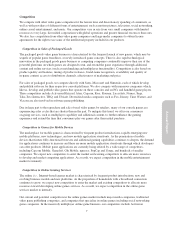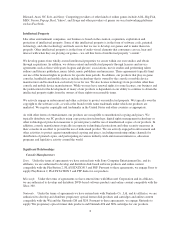Electronic Arts 2011 Annual Report Download - page 90
Download and view the complete annual report
Please find page 90 of the 2011 Electronic Arts annual report below. You can navigate through the pages in the report by either clicking on the pages listed below, or by using the keyword search tool below to find specific information within the annual report.If our marketing and advertising efforts fail to resonate with our customers, our business and operating
results could be adversely affected.
Our products are marketed worldwide through a diverse spectrum of advertising and promotional programs such
as television and online advertising, print advertising, retail merchandising, website development and event
sponsorship. Our ability to sell our products and services is dependent in part upon the success of these programs.
If the marketing for our products and services fail to resonate with our customers, particularly during the critical
holiday season or during other key selling periods, or if advertising rates or other media placement costs increase,
these factors could have a material adverse impact on our business and operating results.
Our business is highly dependent on the success and availability of video game hardware systems
manufactured by third parties, as well as our ability to develop commercially successful products for these
systems.
We derive most of our revenue from the sale of products for play on video game hardware systems (which we
also refer to as “platforms”) manufactured by third parties, such as Sony’s PLAYSTATION 3, Microsoft’s
Xbox 360 and Nintendo’s Wii. The success of our business is driven in large part by the commercial success and
adequate supply of these video game hardware systems, our ability to accurately predict which systems will be
successful in the marketplace, and our ability to develop commercially successful products for these systems. We
must make product development decisions and commit significant resources well in advance of anticipated
product ship dates. A platform for which we are developing products may not succeed or may have a shorter life
cycle than anticipated. If consumer demand for the systems for which we are developing products is lower than
our expectations, our revenue will suffer, we may be unable to fully recover the investments we have made in
developing our products, and our financial performance will be harmed. Alternatively, a system for which we
have not devoted significant resources could be more successful than we had initially anticipated, causing us to
miss out on meaningful revenue opportunities.
Our adoption of new business models could fail to produce our desired financial returns.
We are actively seeking to monetize game properties through a variety of new platforms and business models,
including online distribution of full games and additional content, free-to-play games supported by advertising
and/or micro-transactions on social networking services and subscription services. Forecasting our revenues and
profitability for these new business models is inherently uncertain and volatile. Our actual revenues and profits
for these businesses may be significantly greater or less than our forecasts. Additionally, these new business
models could fail for one or more of our titles, resulting in the loss of our investment in the development and
infrastructure needed to support these new business models, and the opportunity cost of diverting management
and financial resources away from more successful businesses.
Technology changes rapidly in our business and if we fail to anticipate or successfully develop games for new
platforms and services, adopt new distribution technologies or methods, or implement new technologies in
our games, the quality, timeliness and competitiveness of our products and services will suffer.
Rapid technology changes in our industry require us to anticipate, sometimes years in advance, which
technologies we must implement and take advantage of in order to make our products and services competitive in
the market. We have invested, and in the future may invest, in new business strategies, technologies, products,
and services. Such endeavors may involve significant risks and uncertainties, and no assurance can be given that
the technology we choose to adopt and the platforms, products and services that we pursue will be successful and
will not materially adversely affect our reputation, financial condition, and operating results.
Our product development usually starts with particular platforms and distribution methods in mind, and a range
of technical development goals that we hope to be able to achieve. We may not be able to achieve these goals, or
our competition may be able to achieve them more quickly and effectively than we can. In either case, our
products and services may be technologically inferior to our competitors’, less appealing to consumers, or both.
If we cannot achieve our technology goals within the original development schedule of our products and services,
then we may delay their release until these technology goals can be achieved, which may delay or reduce revenue
14
























